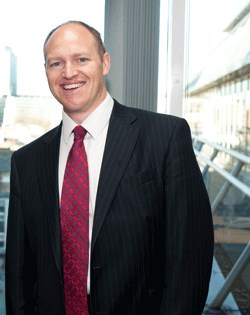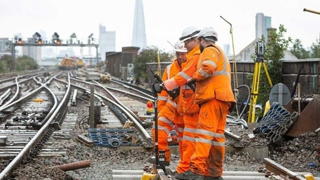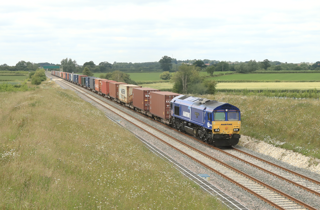Perception is a problem for the Railway Benefit Fund. The charity’s new chairman Tim Shoveller appreciates that… and appreciates that it’s his job to change it.
Shoveller is managing director of the Network Rail-South West Trains Alliance. He’s a busy, busy man, but is still finding the time to try and boost the work the RBF does. And his enthusiasm is palpable as he talks about his new role.
Shoveller’s honesty regarding what he did and didn’t know about the charity is refreshing. And he wants you - the RAIL readers - to help. Obviously donations would be nice, but failing that… ideas. Innovative ideas that could help attract donations are what Shoveller wants. (More of that later.)
RAIL meets Shoveller on January 15, two weeks after he took up his post. Meet at Waterloo, I am told, as he’s found a break in his diary from running one of the busiest franchises on the UK network and the only ‘Deep Alliance’ so far in existence. (The hub of this operation is Britain’s busiest railway station, London Waterloo, where more than 95 million people pass through per year.)
When I arrive, Shoveller has been filming for a promotional video that will be released later this year for the RBF. He has already changed the plans - originally he was supposed to stand on the busy concourse as passengers bustled around him, but that idea was changed to him standing on one of the busy platforms while one of his trains glided past.
RBF Chief Executive Abi Smith is extolling the virtues of the charity’s new chairman. She’s cursing the cold, but is embracing how Shoveller is going about his business. Happy with the filming, it’s decided we should move to Shoveller’s office on Blackfriars Road.
It’s usually a ten to 15-minute walk, but today it takes longer because of Smith’s decision to wear very high heels, and there is concern that we will miss our slot with Shoveller.
Not to worry - we beat him to his office as he had decided to pencil in a meeting with a Network Rail manager for his route… and which he conducted walking from Waterloo. “It’s about being time smart,” he says.
Sat in his office, he bursts with pride at the opportunity. “First, let’s start the credits,” he insists. “Dominic Booth brought focus to the RBF over the past four and a half years. He made the RBF visible.”
Shoveller is the chairman, and there are 11 people on the board. “I chair that. My delegated authorities are done, and it’s really about being able to do different things with a vision and encouragement.”
He explains his background, and how the railway supported its staff. “I joined as a guard and was asked to join a goodwill association.”
He says that the railway has changed dramatically since he first joined British Rail, and that these days there isn’t perhaps the pressure he felt to sign up. The world, he admits, has different views to helping each other, and to charity. But he accepts this, and is certainly not judgmental about it. With Shoveller, everything is an opportunity.
“I have arrived at a time that is really positive for the RBF. My task is to develop it, and add to thinking that has already been done. It is a great time. I have already been involved and things are evolving.”
He admits that bringing his enthusiasm, passion and contacts book are some of the reasons for the RBF wanting him on board.
“I can talk to people, so watch out suppliers,” he chuckles. “And the next time I am speaking at a conference there will be a charity collection.
“The external element is that I can get access to people. They can work with Abi and me, and I can work with her.”
Shoveller also says of the RBF: “I want it to be more relevant. In my day you joined the railway despite the money. You couldn’t recruit and then ask for money, but people did.
“Now, people will say - rightly - ‘hang on, what’s the problem?’ People are well paid, considering. Yes, some are well paid and there’s good security, but for others it is hard times. RBF had an important time then, and now. So, is the RBF relevant now? Yes, and that is the challenge.”
The RBF is perhaps best known for looking after former railway staff who have fallen on hard times. It’s perceived as the charity that looks after people who have lost loved ones, who cannot afford a decent funeral, or even a fridge to keep their food. People who have given their career to serving others are then forced to rely on handouts.
There is a belief, perhaps, that it is only retired railway staff who qualify. Shoveller nods at this perception of the RBF. He needs to change that mentality.
“You wouldn’t simply expect an employee who desperately needs a fridge to come and say so. And, of course, we’d all like extra help with the essentials. Part of the innovation is focusing on information. It’s not all fridges and funerals.
“For some people, it is where do you get help? ‘I have a debt, I don’t want the RBF to pay, but I want support’. That’s what we can do.”
Nor is the RBF tied to a specific union. “They offer help, but the RBF is independent,” he says.
He continues: “There are lots of people - employees, be they for TOCs or Network Rail, usually contractors - that do need help.
“We see zero hour contractors, and there is not the same level of protection. There are roles that are low paid. Cleaners in London can barely live on a minimum wage. They may have several jobs, and what if there is a change in their circumstances?
“Even for someone who is well paid all the cards can suddenly change. All you need is something to happen unexpectedly.”
That is where the change in perception is needed. One key element is who is eligible for help. Presumably those who need help have to have contributed to the RBF pot in the past?
“I thought you had to be in it,” admits Shoveller. “You don’t. You don’t have to have been a contributor to make a claim.”
He adds that anonymity is key. People do
not have to be made aware that the RBF has helped a colleague.
“We don’t want them to show that they have been helped. It is confidential. I think people may well have been helped - I am not sure. The staff at Waterloo, for instance, the gateline and night staff, roles like that. They are not the well-paid jobs, but they need to feel they can have support if needed.
“These are some of the hardest jobs. Working nights and in locations that, frankly, you wouldn’t want to be. You have to believe that it is worthy of supporting these people if they need help. The misconception is that it is only retired guys on hard times. It isn’t.”
Shoveller highlights many ways that railway staff raise funds for charities. He laughs: “My wife has just bought a calendar of guys in the nude, but with strategically placed rail equipment. That’s great, it’s a fund-raiser. The railways are good at charity.
“I think our challenge is that we need to look after our own. They are part of our industry, and we have an opportunity to help.”
He freely admits that people may not have the cash (or time) to help, in which case they may be able to come up with ideas, or to get involved in some other way. He supports that 100%. “They may go on then and help others.”
The RBF also has partnerships, such as with the Citizens Advice Bureau.
“It is about being smarter with our money. Can people be referred? That’s the help on offer. CAB will work with us. It offers support and advice. We can make arrangements with staff to see them.
“We have a partnership with branches that staff can be seen within 48 hours. They can then talk to someone. Weeks can make a difference to someone who needs help. It will make life changes. This is what it is doing now.”
The world has changed, and the challenges faced today by railway staff are different. Shoveller ‘gets’ that… and he embraces it.
“We are proud of the past, but we need to recognise today’s problems,” he says.
“Currently we means test people for their income versus expenditure and savings. That is for a financial guide.
“But the problems could be all sorts of things - ‘my daughter has problems’, for example. And if they cannot be helped, we can offer advice. The problems don’t have to be associated with rail.”
This all sounds very noble, but what does the rail system get from this? Surely it puts a lot in, and expects something back?
“What does rail get? Distractions to staff are a safety concern. Inevitably a concern is a burden. Human nature suggests that they will talk to people.
“We need to help employees to be in a better place. If someone has a problem, they may not do their job. A guard may not walk through the train, for example.”
He also acknowledges that helping staff does have benefits for business.
As for future policy, Shoveller says that discussions are being held with various rail firms. “We want payroll giving,” he says, although he admits that will be hard to arrange.
“There has been a lot of work done in the past year. Abi gets in to talk to people - she’s very good. Relationships are hugely important. The RBF has good partnerships with six or seven firms. We want to maintain that and grow it.
“The way through to them is via the HR Directors, we have found. Managing Directors are busy. We see the HR people, and these relationships work because we give them the information.”
Shoveller says this can also help businesses with their corporate responsibilities.
“Sustainability is good… it helps. Our business is good, we can help each other,” he says.
He’s passionate about this new role, and yet he has just said MDs are busy. He’s an MD, so why is he involved?
“I’m not very good at saying no,” he laughs.
More seriously, he elaborates: “I do this because it is important and for the reasons I have explained. I could have said no. It would have been easy to say I am busy.
“Discussions were held, and I could have said I’m not the right person. My time is limited. There are events like the Spring Ball, for which people MUST buy tickets, and yet I am away with Stagecoach.
“I was conscious about whether I can fulfil this role and not let the RBF down. I have my own time, too - family time.
“I have to put everything in a diary. I had an hour at Waterloo today, and then this interview - this has been the longest period I have had today. Remember, I have 6,000 people running trains, and many can do it far better than me.”
He spoke about innovation, but how does he plan to bring that to the RBF?
“How can we increase donations and support from employees in fun ways? I’m trying to think of ways to do that. It’s not just me suggesting that a number of things should be done all on one day. We need to be relevant.”
He adds: “The railway gets the RBF, but there is a long way to go. We will be more relevant. It will take time to grow. We are relatively small. Its need is great, but it is different now. If the perception was that you had to be a contributor then perhaps it didn’t seem relevant.”
He then produces a shocking statistic.
“The percentage of railway staff who donate through payroll giving is less than 1%. If people give £1 per week, that’s £4 a month. You cannot buy a pint in London for that. If 1% of the industry donates, it is £100,000 per year raised.”
His aim is 1.5% this year. Knowing Shoveller’s ambitious nature, he will go all out to achieve that.
- This feature was published in RAIL 768 on 18 February 2015

















Login to comment
Comments
No comments have been made yet.